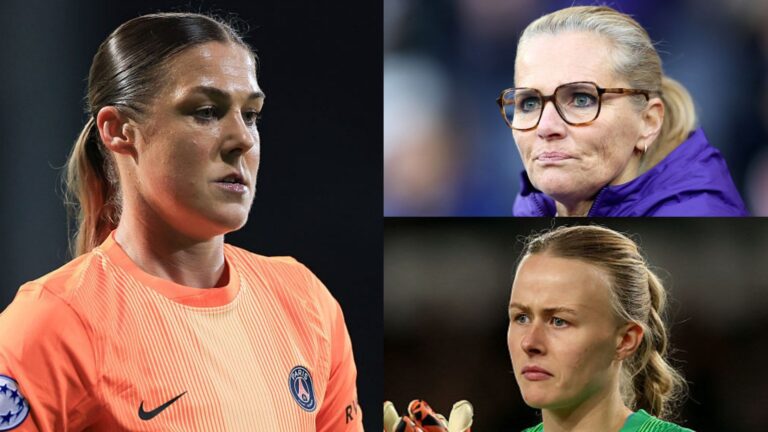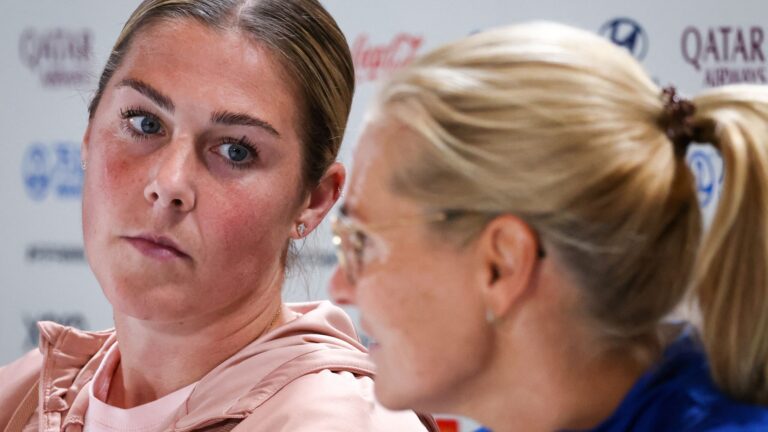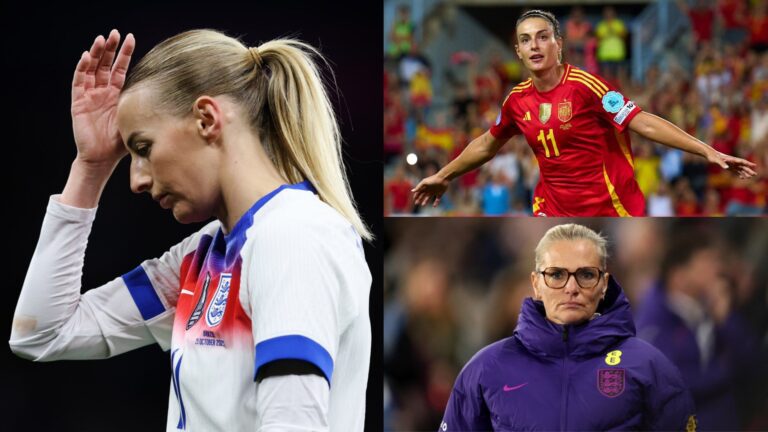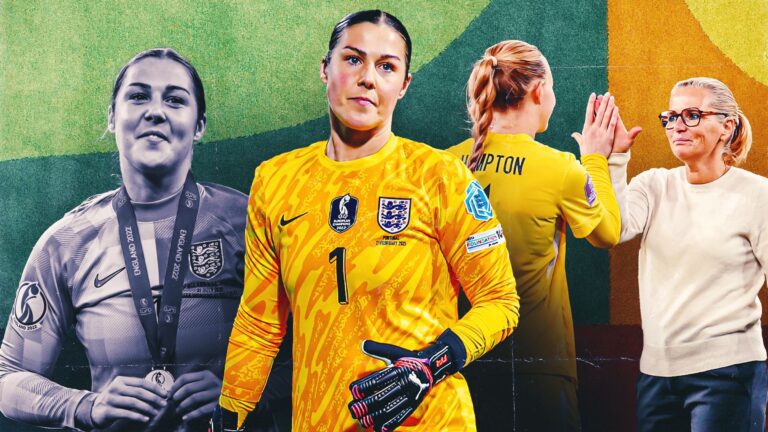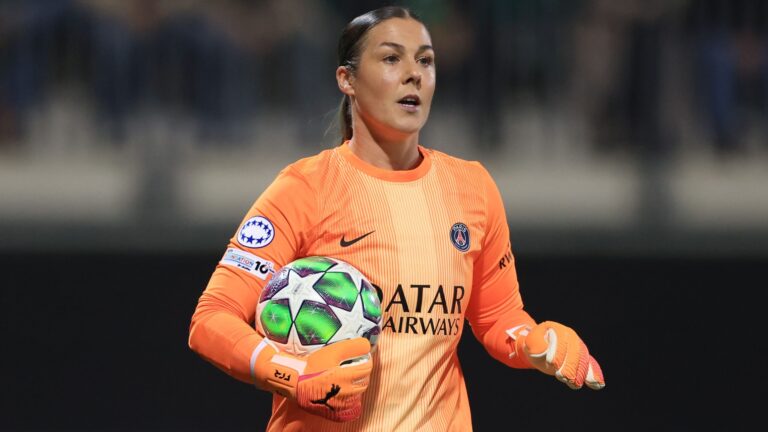
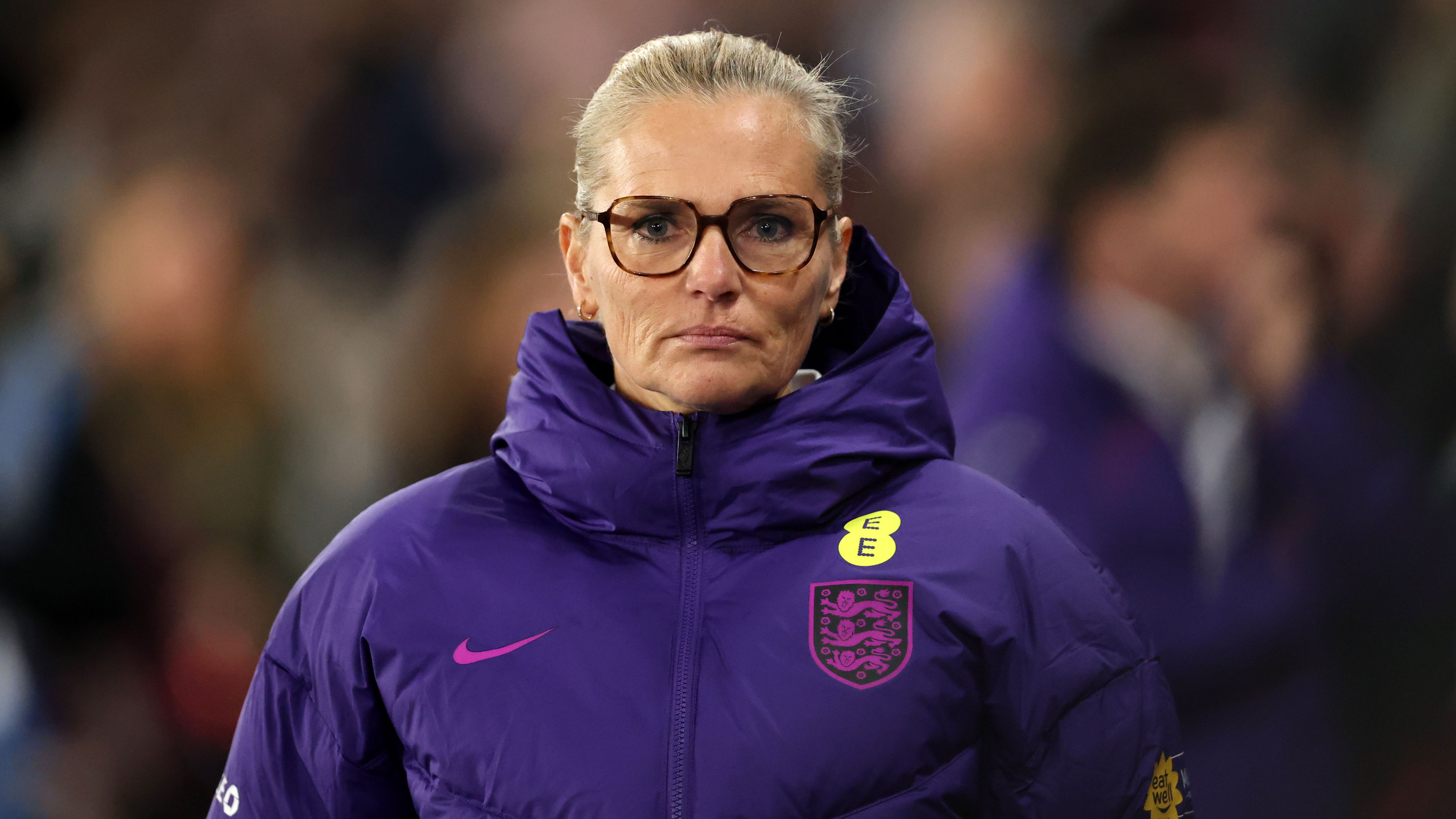
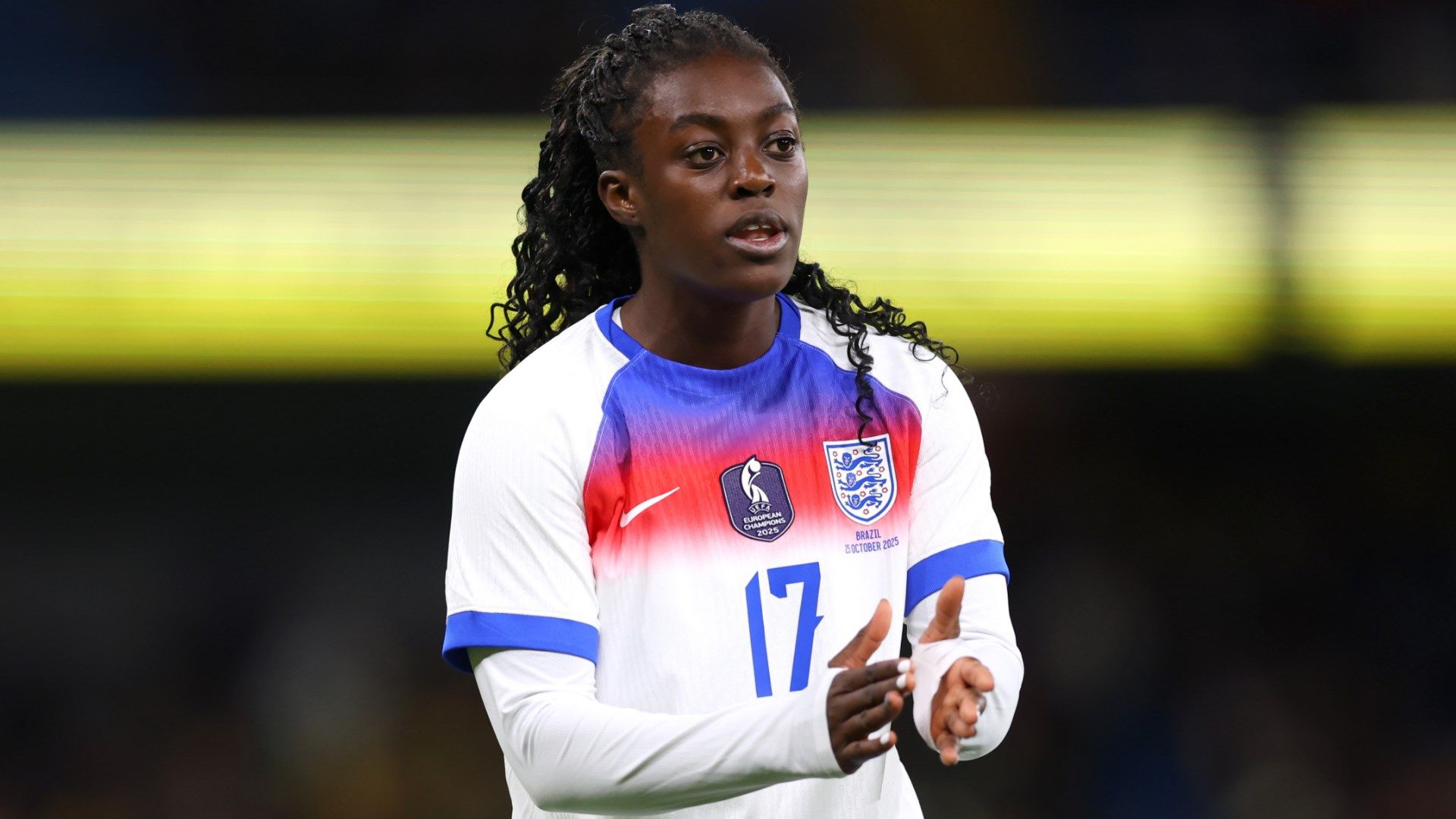
A Shocking Turn in England’s Victory: Michelle Agyemang’s Knee Injury Raises Alarms
While England’s team celebrated a hard-earned triumph against a depleted Australian squad, the evening took a heartbreaking twist with Michelle Agyemang‘s sudden knee injury, highlighting the fragility of athletic careers and the immediate worries expressed by coach Sarina Wiegman.
England’s Strong Performance and Fresh Faces on the Field
The Lionesses had much to celebrate during their comfortable victory, as Australia was left with only 10 players early on following Alanna Kennedy’s dismissal. This matchup saw promising introductions, including Taylor Hinds stepping in at left-back and Lucia Kendall making her mark in midfield, while Sarina Wiegman gave Maya Le Tissier her long-awaited opportunity at centre-back. Although Michelle Agyemang entered the game as a substitute for Alessia Russo with the score already at 2-0, her time on the pitch was abruptly cut short after just 18 minutes due to an apparent serious knee injury.
Initial Reactions from Onlookers
Several observers shared their immediate concerns online. For instance, journalist Kathryn Batte commented on X about how dire the situation appeared for Michelle Agyemang, noting the evident worry among England’s players, with Beth Mead specifically gesturing toward her own knee as she approached. Batte expressed a hope that the injury wasn’t as grave as it seemed.
Likewise, Girls on the Ball reported the tense atmosphere, describing how medical staff and teammates surrounded Michelle Agyemang as she was attended to, with a stretcher brought out amid growing apprehension.
The Incident and Fan Response
As the Brighton forward, currently on loan from Arsenal for the season, received on-field treatment, she was eventually carried off on a stretcher. This moment prompted a powerful display of solidarity, as spectators throughout the stadium rose to their feet, offering applause that reflected both empathy and support for the injured athlete.
Broader Context of Injuries in Women’s Soccer
At this point, no official diagnosis has been released, but the sport of women’s football has seen a surge in anterior cruciate ligament issues lately. Recent examples include long-term absences for players like Liverpool’s Marie Hobinger and Sophie Roman Haug, along with Bayern Munich’s Lena Oberdorf. While there’s optimism that Michelle Agyemang might have escaped the worst, the uncertainty surrounding her condition is understandably anxiety-inducing for everyone involved.
Insights from the Coach and Teammates
Following the match, England’s head coach Sarina Wiegman addressed the media, calling the event distressing and expressing doubt about the outcome based on what she witnessed. She remarked on the unsettling sight of a player being removed on a stretcher, emphasizing that it didn’t bode well.
Teammate Reflections
In an interview captured by ITV, forward Aggie Beever-Jones shared her thoughts, stating that seeing any colleague leave the field in such a way is always difficult, especially a fellow team member. Without knowing the specifics of Michelle Agyemang‘s condition, Beever-Jones conveyed her well-wishes and hoped for a positive recovery, underscoring the emotional toll of witnessing a peer in distress.
The Rise of Michelle Agyemang in International Football
Michelle Agyemang emerged as a standout figure during Euro 2025, often serving as England’s unexpected game-changer and key substitute. Despite her limited professional background when Wiegman first included her in the squad ahead of the event in April, she quickly made an impact by netting an impressive goal just 41 seconds into her international debut against Belgium. This emerging star replicated her heroics at the tournament, delivering a crucial equalizer in the 81st minute against Sweden in the quarter-final to push the game to penalties, which England won, and later securing extra time in the semi-final versus Italy, helping the Lionesses advance once more. Her contributions extended to the final, earning her the young player accolade for her influential role throughout.
Strategic Move to Brighton
To ensure Michelle Agyemang continued to gain valuable playing experience and refine her abilities after that remarkable period, Arsenal arranged for her second loan spell at Brighton. This decision built on her previous 17 appearances in the WSL for the club during the 2024-25 campaign, aiming to foster her growth without the risk of limited opportunities.
Looking Ahead: Recovery and Return Timeline
The timeline for Michelle Agyemang‘s comeback remains unclear and hinges on the extent of her knee injury. In the most severe scenarios, such as an ACL rupture, recovery periods can be extensive and unpredictable. On a brighter note, less serious ligament problems might mean she’s out for just a few weeks, offering a more optimistic path forward for this talented player.
The Incident During the Match
In the high-stakes world of women’s international football, injuries can dramatically alter the course of a game and a player’s career. During England’s thrilling victory over Australia, Michelle Agyemang, a key midfielder for the England women’s national team, sustained a serious knee injury that left fans and teammates on edge. This moment highlighted the physical demands of knee injury in women’s football and raised concerns about player safety in competitive matches.
How the Injury Occurred
Michelle Agyemang’s injury happened in the second half of the match, as England was pushing for a decisive win. Agyemang was involved in a intense challenge while attempting to regain possession of the ball near the midfield. Reports from the sidelines indicated that she twisted awkwardly after a collision with an Australian defender, leading to a immediate and visible knee injury that forced her to collapse on the pitch.
This type of incident is not uncommon in women’s football, where quick turns, sprints, and tackles can lead to serious knee injuries like ACL tears or meniscus damage. Agyemang’s agility and speed have been crucial to England’s strategy, making her injury a significant blow to the team’s dynamics during such a pivotal game.
- Key factors contributing to the injury: High match intensity, wet playing conditions, and the physical nature of the Australia-England rivalry.
- On-field reactions: Medical staff rushed to Agyemang’s side within seconds, demonstrating the importance of quick response protocols in professional sports.
- Impact on gameplay: England’s team had to adapt their formation mid-game, shifting focus to defensive strategies to secure the victory despite the setback.
Immediate Response from the Team
The match officials and England’s coaching staff acted swiftly to address the situation. Coach Sarina Wiegman, known for her emphasis on player welfare, was seen expressing serious knee injury concerns almost immediately after the incident. Wiegman paused the game briefly to ensure Agyemang received proper attention, underscoring how coaches prioritize athlete health over winning at all costs.
This event has sparked broader discussions about preventive measures for knee injuries in women’s football. Teams like England are increasingly incorporating specialized training programs that focus on strength and conditioning to reduce such risks.
Details of Michelle Agyemang’s Injury
Understanding the specifics of Agyemang’s injury provides valuable insights for fans and aspiring athletes. Preliminary assessments suggested a possible severe ligament issue, which is a common type of knee injury in high-impact sports like football.
Type of Knee Injury
Experts believe Agyemang may have suffered an ACL (anterior cruciate ligament) sprain or tear, a frequent knee injury among female athletes due to factors like biomechanics and playing surfaces. This injury often requires extensive rehabilitation and can sideline players for months.
In women’s football, knee injuries are more prevalent than in men’s games, partly because of differences in muscle strength and joint stability. Agyemang’s case highlights the need for ongoing research into gender-specific injury prevention strategies.
- Symptoms observed: Swelling, pain, and instability in the knee, as reported by team physiotherapists post-match.
- Initial treatment: Agyemang was stretchered off the field and underwent immediate scans, emphasizing the role of modern sports medicine in diagnosing knee injuries quickly.
- Long-term outlook: Recovery from a serious knee injury typically involves surgery, physical therapy, and gradual return-to-play protocols, which could affect Agyemang’s participation in upcoming tournaments.
Potential Impact on Her Career
A serious knee injury like Agyemang’s could have lasting effects on her professional trajectory. As a rising star in England’s squad, her absence might mean missing key qualifiers and friendlies, potentially impacting team selections for major events like the Women’s World Cup.
Fans are encouraged to follow updates on Agyemang’s recovery journey, as many athletes have made triumphant comebacks from similar setbacks with the right support.
Coach Sarina Wiegman’s Reaction
Sarina Wiegman, England’s head coach, has been vocal about the incident, using it as a moment to advocate for better player protection in women’s football.
Statements from Wiegman
In post-match interviews, Wiegman expressed her immediate concern for Agyemang, stating, “We saw a serious knee injury that could change everything for her right now. Our priority is her health and making sure she gets the best care.” Her comments reflect a growing trend among coaches to address mental and physical recovery holistically.
Wiegman’s leadership style, which balances tactical prowess with empathy, has helped foster a supportive team environment during such challenges.
- Key quotes from Wiegman: She emphasized the need for “comprehensive knee injury protocols” and called for more investment in women’s football safety measures.
- Broader implications: Wiegman’s response has ignited conversations on social media about how coaches can influence policy changes in sports governance.
Support for Agyemang
Beyond words, Wiegman rallied the team to show solidarity, with players dedicating their victory to Agyemang. This kind of support is crucial in helping athletes cope with the emotional toll of a knee injury.
England’s Performance in the Match
Despite the disruption caused by Agyemang’s injury, England managed to clinch a hard-fought victory over Australia. The match showcased the team’s resilience and depth in women’s football.
- Score highlights: England scored two goals in the second half, capitalizing on counter-attacks to overcome Australia’s defense.
- Player standouts: Teammates stepped up, demonstrating how squad rotation can mitigate the effects of a key player’s knee injury.
- Tactical adjustments: Wiegman shifted to a more cautious style, focusing on maintaining possession to avoid further injuries.
What This Means for England’s Future Games
Looking ahead, England’s upcoming fixtures could be affected by Agyemang’s absence due to her knee injury. The team might need to explore new training drills to prevent similar issues and ensure long-term success in women’s football.
- Potential replacements: Emerging talents could fill Agyemang’s role, offering opportunities for other players to shine.
- Training focus: Expect England to emphasize knee injury prevention techniques, such as balance exercises and protective gear, in their regimens.
- Fan engagement: Supporters can stay informed through official channels, as updates on Agyemang’s recovery will be key to maintaining team morale.
This event serves as a reminder of the unpredictable nature of sports, where a serious knee injury can shift focus from victory to recovery, yet it also highlights the strength and unity within teams like England’s. With proper care, Agyemang’s story could inspire many in the world of women’s football.


